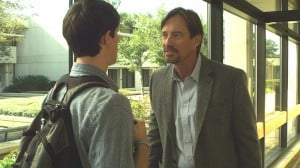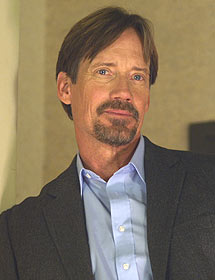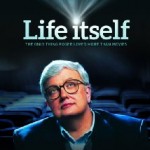Warning: This analysis contains spoilers that include the film’s ending.
For atheists who love movies, the trumpeting and stomping elephant in the room all year long has been God’s Not Dead (hereafter referred to as GND). Although a few Christian film critics laudably objected to this aesthetic shop of horrors (Peter Chattaway’s detailed evisceration is my favorite), that didn’t prevent GND from becoming the top-grossing Christian movie in film history.
For those unfamiliar with its basic storyline, this movie situates its freshman protagonist, Josh Wheaton, against a philosophy professor who demands that all of his students write and sign a proclamation that God is dead. Wheaton alone refuses to follow Professor Radisson’s order, setting the stage for a worldview smackdown.
Rather than rehash the excellent work by Mr. Chattaway, let me move on to point out that not only are atheists egregiously stereotyped in this film (more on that later), but the movie’s creators have constructed a world that manages to be both ugly and superficial in its totality. Beating Matthew 10:34-36 to the punch, even before the conversions begin, every parent-child relationship in this movie save one can only be described as antagonistic, neglectful, or invalidating.
Beyond that, virtually all of this film’s interactions center on control, exploitation, or at the very least, manipulating listeners into accepting one’s beliefs and values. The main exception to this rule is the achingly unfunny pastor-missionary duo, who shares some degree of friendship. Yet until their appearance at the film’s climax, they function primarily as an idiot Greek chorus, repeatedly parroting, “God is good all the time; all the time, God is good.”

This mantra exemplifies the psychological shallows of GND. At Hadleigh University and its environs, you’re either a shiny happy Christian or a mean disgruntled atheist. Moreover, every deep physical, emotional, or relational problem – whether a terminal cancer diagnosis or rejection by an abusive Muslim father – can be replaced by a smile if you only pray the sinner’s prayer or attend a Newsboys concert. I couldn’t help but notice (actually, my fiancée astutely pointed this out) the unintentional irony in one of the story’s twists, wherein the professor’s backslidden girlfriend dumps her controlling, abusive man only to resubmit to a heavenly suzerain.
Were I still a Christian, I’d feel deeply embarrassed by the multiple logical fallacies, immature defense mechanisms, and other forms of intellectual fraud perpetrated by Josh Wheaton and the filmmakers in their efforts to persuade their respective audiences. Since GND attempts to serve as an apologetic for the Christian worldview, I find it reasonable and appropriate to respond to these shortcomings one by one:
– Argumentum ad hominem: Every single atheist behaves nastily in GND, so we may therefore invalidate their intellectual assertions, right? Professor Radisson bullies his students and publicly humiliates his girlfriend (whom he seduced while she was his student, by the by), Dean Cain’s Gordon Gekko character neglects his demented mother, and the leftwing wacko journalist ambushes harmless ol’ Willie and Korie (“Duck Dynasty”) Robertson. And deep down, all of these immoral atheists really just hate God, so we can therefore ignore the ever-growing library of counter-apologetics by the likes of Hitchens, Dawkins, Sam Harris, and Dan Barker, and cozily chalk up their cogent arguments to repressed anger.

– The God of the gaps: Josh Wheaton’s first and third classroom rebuttals of Radisson’s atheism focus upon the Big Bang and the emergence of hundreds of species during the so-called Cambrian Explosion. Wheaton maintains that only God’s creative hand could have enabled these wonders. Well, not necessarily: Lawrence Krauss posits a plausible explanation for the former in A Universe from Nothing, and oodles of biologists have demonstrated that evolution suffices to explain the latter. Invoking God for the stuff we don’t understand places the arguer on a shrinkingly narrow platform in this era of exponentially expanding scientific knowledge.
– The morality argument: In his fourth speech, Wheaton resurrects the old Dostoevskian canard of, “If God doesn’t exist, then everything is permissible.” I’ll make a two-pronged reply to this claim: first, if the Bible remained the sole guide to morality, we’d be living in an even more genocidal, enslaving, misogynistic, and homophobic world than we do at present; and second, I find that humanistic ethics enable me to manage quite well as a compassionate partner, parent, and world citizen, thank you very much. (For those interested in contemplating humanistic ethics more deeply, I strongly recommend a close reading of A.C. Grayling’s The God Argument.)
– Shifting the burden of proof: Wheaton fallaciously transfers responsibility for the mental heavy lifting to Radisson’s camp. To borrow from Carl Sagan, “Extraordinary claims require extraordinary evidence.” The onus thus falls upon evangelical apologists to convince us why their holy book and deity uniquely compel our belief among thousands of competitors in the 21st Century marketplace of ideas.
– Projection: Wheaton and the filmmakers accuse Radisson of denying his students free choice in his classroom, yet their God forces humankind to choose between the harsh dichotomy of religious adherence or hell. A failing grade versus eternal damnation: will the real intimidator please stand up?
– Appeal to emotion: GND’s creators work feverishly upon the viewers’ desire to bathe in the warming emotions springing from God’s approval and group conformity. We twice hear the words from Matthew 10:32-33, reminding Christians that acknowledging God will result in God’s acknowledgement (with the shaming converse, of course, that failing in this obligation will result in divine shunning). And when everyone stands up at the end of Josh’s last speech to proclaim their newfound belief, who wouldn’t crave the dopamine rush from joining this implausibly unanimous crowd?
– The Straw Man argument: GND postulates a world in which atheists (and secular universities by extension) long to destroy the faith of innocents by coercion and oppression. Never mind the recent sociological data revealing that over 75% of U.S. professors are theists; why let the facts get in the way of a big box office grab?
Horrifically, the filmmakers don’t rest contentedly in solely knocking down the straw man; they must utterly demolish their flimsy piñata. A few scenes after Radisson’s girlfriend breaks up with him in the university cafeteria (in front of many of his colleagues and students), moviegoers watch him get struck by a car and suffocate in his own blood.
I would even go so far as to contend that this latter sequence functions as three-step religious pornography. For starters, viewers revel in a slow motion “God’s eye view” of Radisson’s catapulting over the vehicle; thus always to tyrants! Next, we’re served up the spiritual orgasm of his sinner’s prayer, foisted upon the dying professor by the conveniently proximate pastor-missionary pair. Finally, we bask in the afterglow, as the missionary (standing next to the spot where Radisson’s corpse lay) grinningly exclaims that all of this is cause for celebration. In case this isn’t already ecstatic overload, this sequence is interspliced with imagery from a jubilant Newsboys show.

In an interview with the National Catholic Register, two of GND’s screenwriters stated that they crafted a movie for “Christians who are exasperated with being pressed upon and beaten down.” Huh? Reliable surveys report that only 5-7% of Americans are atheists or agnostics, hardly a hulking majority. Currently, no member of U.S. Congress claims non-belief, an atheist presidential candidate would be unelectable, and our Supreme Court possesses a notable rightward tilt (not to mention that as a Tennessean, I live in one of seven states whose constitution bars me as an unbeliever from holding public office).
A paranoid persecution narrative sells movie tickets and riles up credulous Christians, but the bogus worldview of God’s Not Dead merits the same scorn as 9/11 “Truthers” and alien-abduction fairy tales. When you couple this nonsense with the grotesque stereotyping of a minority group – on a cinematic par with blackface minstrels of yore and Alfred Hitchcock’s subtly gay moral defectives – a reasonable person regardless of faith persuasion can only conclude that God’s Not Dead deserves nothing less than contemptuous, repulsed rejection.
(Note to parents: God’s Not Dead is rated PG for thematic material, brief violence, and an accident scene. If you’re willing to take the time and analyze this film with your teens, it’s worth checking out. After viewing this, my 13-year-old son cheerily chirped, “Now I’ve seen a propaganda film!”)
1 out of 5 stars
















